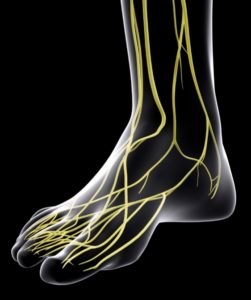Dr. Rainwater hopes to educate patients about PAD and how to recognize and treat it early for better outcomes.
“These symptoms are very similar to those of PAD,” explained Joel Rainwater, M.D., medical director of Comprehensive Integrated Care (CiC). “They are so similar that many are given a diagnosis of neuropathy when it may be PAD, or PAD may be making their neuropathy worse.”
Peripheral neuropathy is nerve damage that causes sensations of pins-and-needles, numbness, weakness, burning and/or cramping in the feet.
Peripheral artery disease (PAD) is a circulation problem where fatty deposits build up inside the arteries supplying blood to the lower body. These deposits harden and block blood flow to the legs and feet.
PAD causes many of the same symptoms as neuropathy, and both can exist at the same time. But in many cases, circulation issues are sometimes overlooked as contributing to or causing symptoms that mimic neuropathy.
“Blood brings oxygen and nutrients to your feet and toes, which they need to stay healthy,” said Rainwater. “When your feet are not getting an adequate supply, they start sending signals such as pain, burning, tingling, numbness or cramping.”
Which is it? Neuropathy or PAD?
When patients are having these types of symptoms, they often receive a prescription for neuropathy medication. Dr. Diana Perry of CiC Foot & Ankle sees many patients whose feet continue to bother them even when they are taking this medication.
“Pills aren’t a cure; they just treat the symptoms, so the body doesn’t notice them,” said Perry. “It’s concerning, because if we don’t know what is causing the symptoms, the medication could hide a developing problem and let it get worse.”
It’s important to determine the root of these symptoms. Getting the proper diagnosis is the first step to getting better. “We need to turn over every piece of the puzzle to see what’s causing the pain,” said Perry.
Diagnosing PAD is simple and can be done right in the doctor’s office with ultrasound or an ankle-brachial index (ABI) test. A blood pressure cuff and ultrasound device are used to compare the blood pressure in your legs to the blood pressure in the rest of your body. It’s easy and painless.
One of the Biggest Success Stories in All of Medicine
PAD is a progressive cardiovascular disease that, left untreated, will only get worse and lead to more pain, circulatory problems and, in the worst cases, amputation. But treatments are available.
“The good news about PAD is that there’s hope,” Rainwater said. “There is treatment and it’s excellent. It’s been one of the biggest success stories in all of medicine.”
Using tiny tools and real-time imaging, Rainwater and other endovascular specialists at CiC are able to access the blocked peripheral arteries, clear plaque away and restore normal blood flow. “Establishing blood flow reestablishes the oxygen and nutrient supply so healing can begin,” explained Rainwater.
The procedure is done right in an office setting, and patients are able to get back on their feet and resume everyday living with almost no downtime and no overnight hospital stay. Arteries are accessed through a tiny puncture in the skin, so there are no stitches and a very low risk of infection. Medicare and most insurance plans cover the treatment.
You Don’t Have to Suffer
Dr. Rainwater hopes to educate patients about PAD and how to recognize and treat it early for better outcomes. If you have burning, tingling, cramping or numbness in your legs or feet, or if you are taking neuropathy medications that don’t seem to be working, you don’t have to suffer.
“I’m here to tell patients that there are options,” Dr. Rainwater said. “All they have to do is ask.” FBN
By Reisha Zang
Dr. Joel Rainwater, M.D., has focused his career on teaching people to recognize PAD and take action. He can be reached at CiC 928-719-7400.
Dr. Diana Perry, DPM, specializes in limb preservation and trauma of the foot. She can be reached at CiC 928-719-7400.
Reisha Zang is director of communication at CiC. You may contact her at 928-719-7400 or reisha.zang@ciccenters.com.





